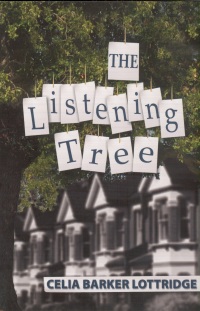| ________________
CM . . .
. Volume XVII Number 23. . . .February 18, 2011 
 |
The Listening Tree.
Celia Barker Lottridge.
Markham, ON: Fitzhenry & Whiteside, 2010.
172 pp., pbk., $11.95.
ISBN 978-1-55455-052-4.
Subject Headings:
Interpersonal relations-Juvenile fiction.
Self-esteem-Juvenile fiction.
Courage-Juvenile fiction.
Grades 4-7 / Ages 9-12.
Review by Ruth Latta.
*** /4
|
| |
|

excerpt:
[Ellen] heard all sorts of things from the kids at school about the men who had gone to look for work. They were living in camps by the railroad. They were in jail. They were working in the mountains or in a shipyard. But where was her dad? All she could see when she thought of him was that freight car door closing.
The year is 1935, the nadir of the Great Depression, and the father of 10-year-old Ellen has left the family's dust bowl farm in Saskatchewan to ride the rails in quest of work. He promises to send money home. Meanwhile, Ellen's mother has shared the family's plight with her sister, Gladys, a widow in Toronto who has turned her home into a boarding house to make ends meet. Aunt Gladys invites Ellen and her mother to come and live with her in return for helping with household tasks.
The cover blurb says that The Listening Tree is an uplifting novel of a young girl's courage and ingenuity amid the challenges of the Great Depression." Raised by parents with vivid memories of the Great Depression, I grew up on stories about male relatives toiling at winter make-work projects wearing worn-out boots stuffed with newspapers to keep out the cold. I heard stories about rural schoolteachers who taught for room and board only, as the school boards didn't have sufficient revenues to pay them. As an adult, researching a book on the Canadian Youth Congress, I interviewed senior citizens who told grim stories of dreams deferred, homelessness, hunger and anger.
Lottridge does not show us homeless men lined up at a soup kitchen, or Ellen's father's life as a transient. The threatened eviction of the next door neighbours, a common Depression-era problem, is eventually solved by a civilized appeal to a kindly landlady (who lives in a wealthy neighbourhood) who is being tricked by her agent.
Like Ellen, I wondered about Aunt Gladys's mysterious daily retreat to her private quarters in the basement. Is she engaged in some shady activity to make ends meet? Actually, no. She derives solace from sitting among her household furnishings from better days. Her boarders, in general, are remarkably positive in the face of limited prospects.
Some Canadians like to view our national crises and calamities as growth experiences that built character. Since The Listening Tree is aimed at 10-year-olds, one would not expect this novel to delve deeply into economic issues or to show too much human suffering. Still, it seemed to me that the author could have shown more Depression-era situations. (Listing them, as in the quote at the beginning of this review, has less of an impact than showing them.)
Two physical objects in the novel serve as metaphors. One is the listening tree, a big elm which Ellen accesses through an upstairs window and uses as an observation post to learn about the neighbourhood. The other is Casa Loma, not the tourist site of today, but a ruin as it was in 1935. The tree seems to suggest that, although Ellen's early childhood home, the prairie, has turned to dust, the natural environment still flourishes elsewhere. The tree, therefore, conveys hope that the collapsed economy will similarly revive. The castle, full of scrap metal which a kindly watchman allows the children to collect and sell, suggests that something can be salvaged from the past to provide for the future.
These hopeful metaphors, and a solution to the eviction crisis, are all the closure that readers get. Questions raised at the beginning of the novel are not answered at the end. As the novel concludes, Ellen has no idea when, if ever, she and her mother will see her father again. The mature reader can think of some possible outcomes, but these are too complex and worrisome for young readers. Wisely, Lottridge opted for an open ending.
Recommended.
Ruth Latta's books, including They Tried: The Story of the Canadian Youth Congress, are listed on her website www.cyberus.ca/rklatta/RuthLatta.html

To comment
on this title or this review, send mail to cm@umanitoba.ca.
Copyright © the Manitoba Library Association. Reproduction for personal
use is permitted only if this copyright notice is maintained. Any
other reproduction is prohibited without permission.
NEXT REVIEW |
TABLE OF CONTENTS FOR THIS ISSUE
- February 18, 2011.
AUTHORS |
TITLES |
MEDIA REVIEWS |
PROFILES |
BACK ISSUES |
SEARCH |
CMARCHIVE |
HOME |
